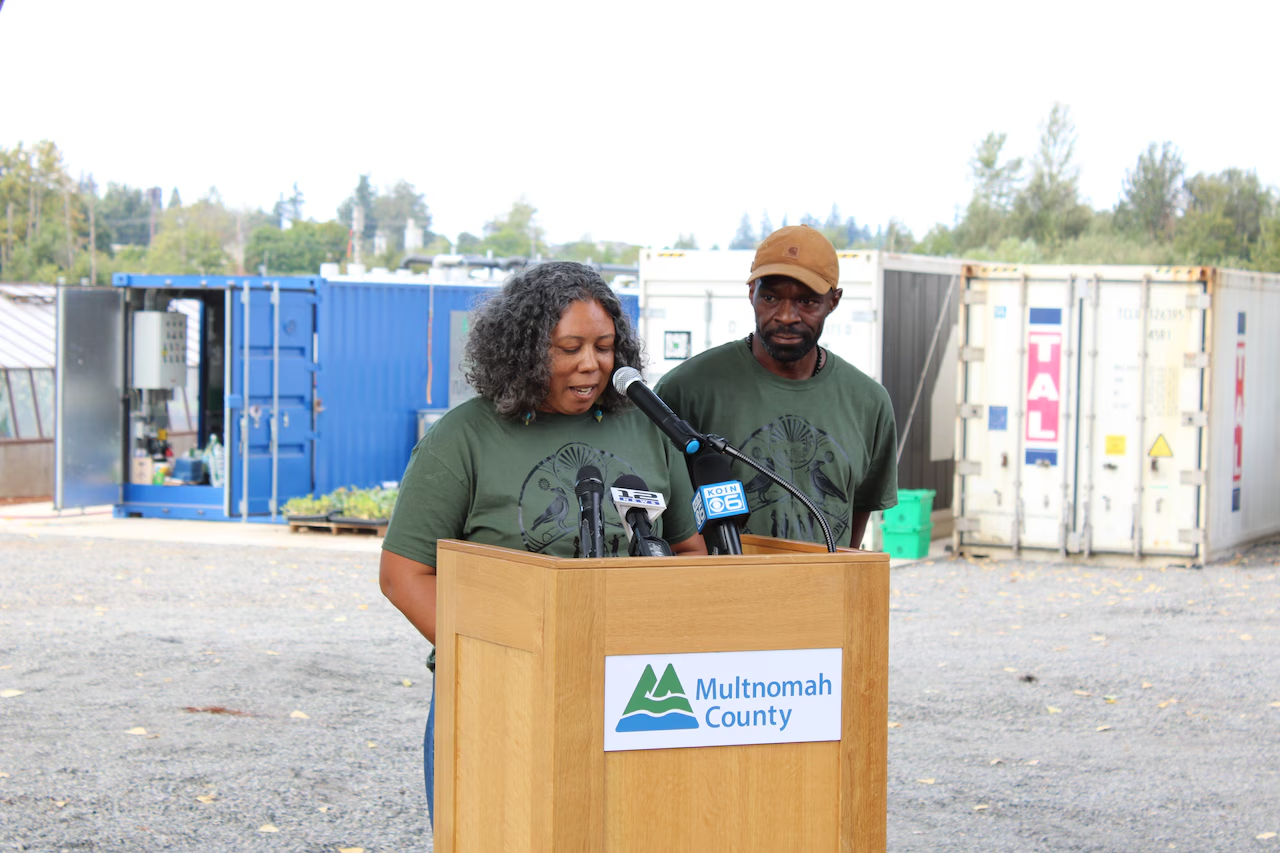PORTLAND, Ore. – What began as a modest condo garden has grown into a movement for food justice, cultural restoration, and community empowerment. Shantae Johnson and Arthur Shavers, partners in both life and farming, now operate the newly reopened CROPS Farm in Troutdale, turning a once-overgrown county property into a vibrant hub for food access and training for farmers of color.
From Condo Garden to County Farm
Johnson and Shavers often recall their first small garden, where they spent late nights replanting after neighborhood cats tore through the crops. That devotion sparked a deeper calling. By 2016, they had left their jobs—Johnson in public health and Shavers as a long-haul truck driver—to pursue farming full-time through Oregon State University’s Urban Farmers Apprenticeship Program.
With six children between them and no land of their own, the couple relied on partnerships to get started. The Oregon Food Bank lent them their first small plot, which became the launchpad for Mudbone Grown, their farming business. Later, they created the Feed’em Freedom Foundation, a nonprofit that runs a food pantry and small urban farm in Rockwood, serving hundreds of low-income residents.
Also Read
Reclaiming CROPS Farm
Their latest endeavor, CROPS—short for Community Reaps Our Produce and Shares—sits on three acres of Multnomah County land near the historic Edgefield complex, once the site of the county’s Poor Farm.
The property had been neglected, little more than blackberry brambles when Johnson and Shavers signed on to operate it in 2021. “It was nothing but a dirt field, no water, no electricity. Our first year, everything died,” Johnson recalled.
Despite the setbacks, the couple persisted. With support from the county, grants from nonprofits like Growing Justice and Feeding America, and countless volunteer hours, they rebuilt the land into a working farm. By August 2025, they celebrated its official reopening after years of construction and development.
A Modern, Community-Driven Farm
Today, CROPS is a blend of tradition and innovation. Visitors will find rows of vegetables, herbal gardens, a barn, and a greenhouse. More recently, the couple installed a hydroponics farm in a freight container, a biodigester to turn plant waste into energy and fertilizer, and refrigerated storage to preserve produce.
The farm now distributes food to about 200 families each week, partnering with organizations like Care Oregon and Zenger Farm. Produce also stocks Feed’em Freedom’s Northeast Portland pantry, ensuring food reaches communities most in need.
Equally important, Johnson and Shavers are using the site to support Black, Indigenous, and other farmers of color, helping them access land, training, and markets often denied to them.
“This is just a prime example of what we can get done when we work together through partnerships,” said Commissioner Vince Jones-Dixon, who represents East Multnomah County.
History Rooted in Equity
The land itself holds deep historical weight. Multnomah County operated a Poor Farm on the property in the early 1900s, offering housing and work to struggling residents. It later became the Edgefield Nursing Home before closing in 1982. The county sold most of the land to McMenamins in 1990 but retained a portion, where the CROPS program began in 2010.
Originally volunteer-run, CROPS provided produce to food banks until it shut down in 2017. By the time Johnson and Shavers took over, the program needed new vision and leadership.
“This farm is not just about growing food,” Johnson explained. “It’s about honoring history, creating opportunity, and addressing inequities that have existed for generations.”
The Cost of Transformation
Restoring the site has not been cheap—or easy. Shavers estimated total investment so far at $1.5 million, funded by county contributions, state grants, and nonprofit partners. Multnomah County itself provided about $500,000 to establish utilities, a barn, and driveway access.
“It has not been easy, not at all,” Johnson admitted. “But we’re really thankful for the partnerships we’ve been able to build.”
Building a Broader Food Hub
For Johnson and Shavers, CROPS is just one part of a larger vision. In February 2025, they purchased five acres in Gresham, the first land they truly own. There, they hope to consolidate their operations—combining farming, food distribution, and farmer training into a regional food hub.
The goal is to create a marketplace where local farmers, fishers, and food producers can sell directly to the community, ensuring both fair pay and access to fresh food.
“We wanted to live on property in a rural area, but unless we’re millionaires, we’d have to work, right?” Shavers said, recalling long hours on the road as a truck driver. Farming offered a way to live with purpose while addressing food insecurity.
Recognition and Responsibility
County leaders have praised the couple’s persistence. At the reopening ceremony, Chair Jessica Vega Pederson called CROPS “a huge accomplishment in an often overlooked part of Multnomah County’s economic landscape—the agricultural sector that thrives right here in Oregon’s most urban county.”
For Johnson and Shavers, the recognition is gratifying, but the mission remains pressing. Their work is not just about food, but about representation—ensuring that farmers of color have access to land and markets in a system historically dominated by others.
“We come from farming families ourselves,” Johnson said. “This is about stepping back into that history and making sure the next generation can too.”
Looking Ahead
Even as they juggle raising a family, running two organizations, and building out CROPS, Johnson and Shavers remain focused on the bigger picture. They hope their journey inspires others—especially young BIPOC farmers—to see agriculture not just as work, but as empowerment.
“I’m really thankful to Art as a partner not only in life, but on this pathway of purpose that we have set upon,” Johnson said. “It’s a lot of work, but we’re both very passionate about it.”
With their dedication, the once-neglected farm has become a symbol of renewal. And for Portland’s eastside communities, CROPS is sowing more than food—it is planting seeds of justice, opportunity, and hope.












